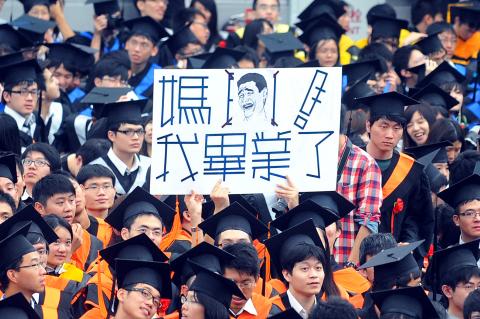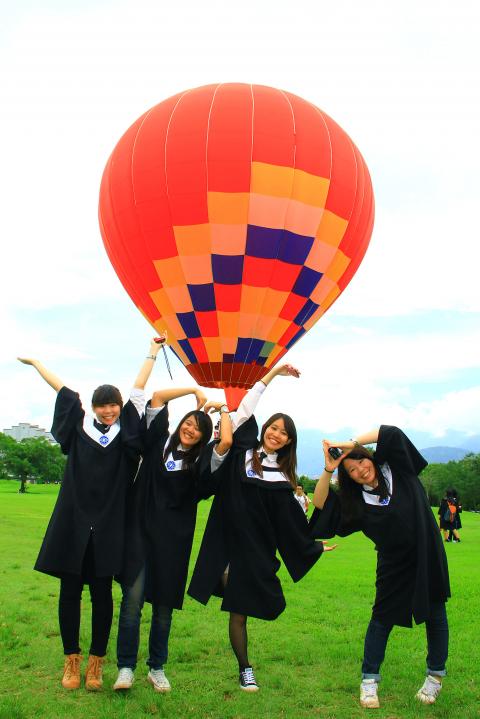Several universities had graduation ceremonies yesterday with political figures and leading businesspeople invited to address graduates and share their words of wisdom with the graduating classes.
Former premier Liu Chao-shiuan (劉兆玄), who graduated from National Taiwan University (NTU) in 1965, yesterday attended the university’s commencement ceremony and encouraged new graduates to be open to innovation and new ventures.
He drew an analogy between coconut trees — the most well--recognized symbol of the university, whose celebrated Coconut Grove Boulevard (椰林大道) stands in front of the campus — and students of the high-ranking university.

Photo: Wang Yi-sung, Taipei Times
“Walking through the front gate of NTU, what comes directly into view is the university road lined with coconut trees. However, the main characteristic of these trees is that they are preoccupied with upwards growth and reluctant to give umbrage,” he said.
In contrast, what epitomizes National Cheng Kung University in Greater Tainan is the many old banyan trees that are rooted in the ground, with luxuriant foliage that creates shade for the people, Liu said.
Liu said NTU was a time-honored institution that offered education in various fields of expertise and enjoyed ample resources, but its greatest pride is in the acclaimed qualities of its students, who are therefore shouldered with great responsibility.

Photo: Tung Chen-kuo, Taipei Times
“The cultivation of an intellectual elite necessitates academic knowledge and general knowledge, as well as courage and insight and appreciation,” he said.
However, Liu said that while Taiwan has nurtured an abundance of doctorate holders, the country has only seen the creation of a handful of innovative companies.
“If even NTU graduates are in dread of innovating and taking chances, where will Taiwan’s [global] competitiveness come from in the future?” Liu asked.
NTU president Lee Si-chen (李嗣涔) said the university not only has coconut trees growing on campus, but dragon junipers alongside them, which provide shade, adding that the university is putting more weight on cooperation between students.
The National Taiwan University of Science and Technology in Taipei chose a venue simulating an air terminal to stage its commencement ceremony.
On entering the venue, graduates handed over a boarding pass written with their future aspirations to service staff dressed as flight attendants, while holding in their hands a mock passport with the sentence “[We are] graduating” printed on its cover — a ritual designed to represent graduates heading to their futures.
In central Taiwan, graduates of Tunghai University, Greater Taichung, passed a wooden knocker on to others during their graduation ceremony, as a kind of “torch-passing” ceremony.
In his speech to the graduates, Vice Premier Jiang Yi-hua (江宜樺) encouraged the young adults to develop enthusiasm, ideals, tolerance, respect and persistence.
In a ceremony at National Chiao Tung University in Hsinchu County, Phison Electronics Corp president Pan chien-cheng (潘健成), who is also an alumnus of the university, shared with graduates his life experience and ideals.
“Passion is the key to success, while sustainable success requires a sense of responsibility. This generation of young people does not lack capability, but an [appropriate] attitude,” Pan said.
President Ma Ying-jeou (馬英九) yesterday attended the commencement ceremony at National Taiwan University of Arts, during which he urged graduates to not only be creative, but to give thought to how to make use to it and to employ it to inpire their imagination.
Vice President Wu Den-yih (吳敦義) appeared at the graduation ceremonies of three universities in Greater Kaohsiung, including I-Shou University, Cheng Shiu University and National Kaohsiung Normal University.
Translated by Stacy Hsu, Staff Writer

‘DENIAL DEFENSE’: The US would increase its military presence with uncrewed ships, and submarines, while boosting defense in the Indo-Pacific, a Pete Hegseth memo said The US is reorienting its military strategy to focus primarily on deterring a potential Chinese invasion of Taiwan, a memo signed by US Secretary of Defense Pete Hegseth showed. The memo also called on Taiwan to increase its defense spending. The document, known as the “Interim National Defense Strategic Guidance,” was distributed this month and detailed the national defense plans of US President Donald Trump’s administration, an article in the Washington Post said on Saturday. It outlines how the US can prepare for a potential war with China and defend itself from threats in the “near abroad,” including Greenland and the Panama

A wild live dugong was found in Taiwan for the first time in 88 years, after it was accidentally caught by a fisher’s net on Tuesday in Yilan County’s Fenniaolin (粉鳥林). This is the first sighting of the species in Taiwan since 1937, having already been considered “extinct” in the country and considered as “vulnerable” by the International Union for Conservation of Nature. A fisher surnamed Chen (陳) went to Fenniaolin to collect the fish in his netting, but instead caught a 3m long, 500kg dugong. The fisher released the animal back into the wild, not realizing it was an endangered species at

The Chinese Nationalist Party (KMT) is maintaining close ties with Beijing, the Democratic Progressive Party (DPP) said yesterday, hours after a new round of Chinese military drills in the Taiwan Strait began. Political parties in a democracy have a responsibility to be loyal to the nation and defend its sovereignty, DPP spokesman Justin Wu (吳崢) told a news conference in Taipei. His comments came hours after Beijing announced via Chinese state media that the Chinese People’s Liberation Army’s Eastern Theater Command was holding large-scale drills simulating a multi-pronged attack on Taiwan. Contrary to the KMT’s claims that it is staunchly anti-communist, KMT Deputy

The High Prosecutors’ Office yesterday withdrew an appeal against the acquittal of a former bank manager 22 years after his death, marking Taiwan’s first instance of prosecutors rendering posthumous justice to a wrongfully convicted defendant. Chu Ching-en (諸慶恩) — formerly a manager at the Taipei branch of BNP Paribas — was in 1999 accused by Weng Mao-chung (翁茂鍾), then-president of Chia Her Industrial Co, of forging a request for a fixed deposit of US$10 million by I-Hwa Industrial Co, a subsidiary of Chia Her, which was used as collateral. Chu was ruled not guilty in the first trial, but was found guilty